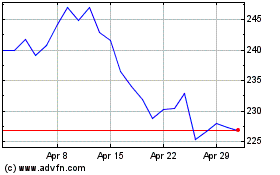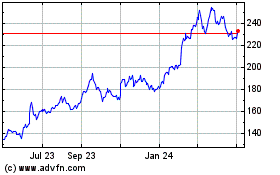Toyota Still Has Many Issues,' President Says
January 12 2016 - 9:10PM
Dow Jones News
Toyota Motor Corp. has entrenched itself as the world's
top-selling car company, but its president says the Japanese auto
giant still has work to do if it wants to consider its vehicle
lineup as the industry's best.
Akio Toyoda, in an interview at the North American International
Auto Show, said, "Toyota still has many issues in terms of making
better cars and becoming a better company."
Mr. Toyoda became president of his family's company in 2009,
shortly before the company had to deal with sudden-acceleration
problems that blossomed into a safety crisis. Last year, Mr. Toyoda
lifted a three-year freeze on capacity expansions, authorizing new
factories in China and Mexico.
Toyota remained the world's dominant figure through the
turbulence, fending off Volkswagen AG and General Motors Co., which
it passed last decade in terms of global vehicle sales. It sells 10
million light vehicles a year, or about 11% of total industry
volume.
In addition to being big, Toyota has a reputation for
outperforming Detroit in the 1980s and 1990s in several important
aspects of car making, including manufacturing, sales and quality.
Many executives have used Toyota's operating philosophy—built on
continuous improvement and keeping things simple—as a blueprint for
restructuring.
Ford's former chief executive, Alan Mulally, often said his "One
Ford" plan that helped save Ford from bankruptcy was shaped by his
research of Toyota.
Armed with cash reserves that far exceed most other automotive
companies, Mr. Toyoda isn't resting on laurels.
"Toyota could serve as a benchmark when we are talking about the
single issue of volume," Mr. Toyoda said. "But when we are talking
about better cars, I don't think Toyota has become a company that
would serve as a benchmark in all fields,"
Mr. Toyoda is spearheading a campaign to beef up Lexus and
funding a push into autonomous vehicles and fuel cells. During the
interview, he repeatedly returned to the company's mission of
making cars that are "fun to drive."
Having fun isn't Mr. Toyoda's only priority. The company
recently announced a plan to all-but eliminate vehicles powered by
gasoline and diesel engines by 2050. It will do that by moving to
hybrids, fuel-cell cars and electric vehicles.
Regulation will play a role in the company's ability to meet its
ambition.
"We want to carefully determine the difference between what we
can offer and what the authorities are asking for," Mr. Toyoda
said, adding that marketplace factors also play a role.
"Even if we could attain something, it's difficult to understand
the point if that becomes very unaffordable (for the
consumers)."
"We don't have an answer now, but we want to work with others to
figure it out."
While he played down the likelihood of acquisitions in the
company's future, Mr. Toyoda said the company remains open to
partnerships.
"I think Toyota is a company that is the poorest in
acquisitions. In the history of 70 or 80 years of Toyota there has
never been any case of a successful acquisition," he said. But "for
the purpose of coming up with ever better cars … we will continue
to have an open-door policy, willing to join hands with
others."
Write to John D. Stoll at john.stoll@wsj.com
(END) Dow Jones Newswires
January 12, 2016 20:55 ET (01:55 GMT)
Copyright (c) 2016 Dow Jones & Company, Inc.
Toyota Motor (NYSE:TM)
Historical Stock Chart
From Jun 2024 to Jul 2024

Toyota Motor (NYSE:TM)
Historical Stock Chart
From Jul 2023 to Jul 2024
